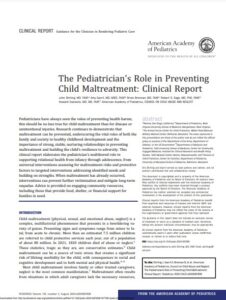 Supporting children well-being from infancy through adolescence
Supporting children well-being from infancy through adolescence
Pediatricians have always seen the value of preventing health harms; this should be no less true for child maltreatment than for disease or unintentional injuries. Research continues to demonstrate that maltreatment can be prevented, underscoring the vital roles of both the family and society in healthy childhood development and the importance of strong, stable, nurturing relationships in preventing maltreatment and building the child’s resilience to adversity. This clinical report elaborates the pediatrician’s multitiered role in supporting relational health from infancy through adolescence, from universal interventions assessing for maltreatment risks and protective factors to targeted interventions addressing identified needs and building on strengths. When maltreatment has already occurred, interventions can prevent further victimization and mitigate long-term sequelae. Advice is provided on engaging community resources, including those that provide food, shelter, or financial support for families in need.
Publication Information
Authors
John Stirling, MD, FAAP, Amy Gavril, MD, FAAP, Brian Brennan, MD, FAAP, Robert Sege, MD, PhD, FAAP*, Howard Dubowitz, MD, FAAP
*Affiliated with the HOPE National Resource Center
Journal
Publication Date
July 22, 2024
Keywords
child abuse, child abuse prevention, neglect, protective factors, wounds and injuries, community resources, substance use disorders, stressor
Citation
Stirling J, Gavril A, Brennan B, Sege R, Dubowitz H. The Pediatrician’s Role in Preventing Child Maltreatment: Clinical Report. Pediatrics. 2024 July 22. 154(2): e2024067608. DOI: 10.1542/peds.2024-067608




